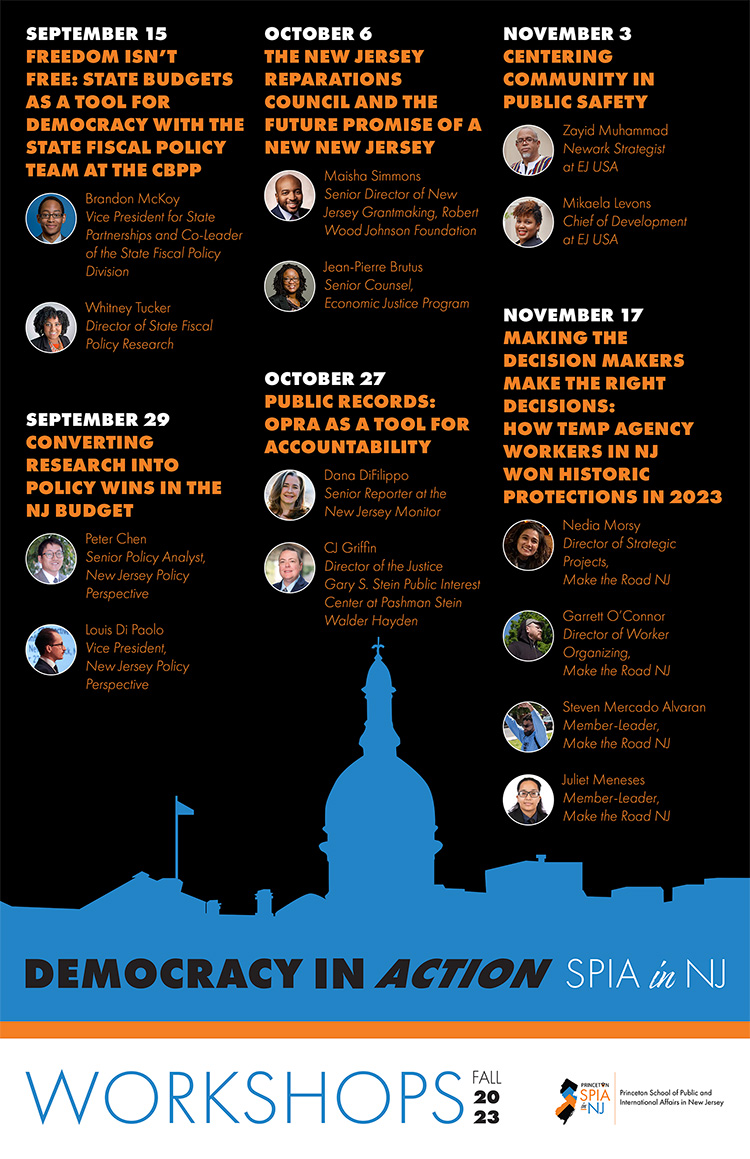

In Its First Semester, SPIA in New Jersey’s “Democracy in Action” Series Brings State-Wide Issues to Princeton
 On April 28, the Princeton School of Public and International Affairs launched its SPIA in New Jersey initiative. More than eight months later, Founding Director Anastasia Mann hasn’t taken her foot off the gas pedal.
On April 28, the Princeton School of Public and International Affairs launched its SPIA in New Jersey initiative. More than eight months later, Founding Director Anastasia Mann hasn’t taken her foot off the gas pedal.
Since the launch, SPIA in New Jersey has hosted six events on campus through its “Democracy in Action” series. The sessions invite state and regional change makers to Princeton’s campus to talk about topics ranging from state reparations to community safety and public records accountability. It is an intentional choice, according to Mann, to feature programming that brings together the campus community and the greater New Jersey public affairs sector to discuss and learn about pressing topics in the Garden State.
“The overarching consideration was policy relevance,” Mann said. “For example, the New Jersey Legislature is considering a bill that would dramatically scale back the Open Public Records Act. Attorney CJ Griffin, the leading OPRA attorney in the state, and NJ Monitor reporter Dana DiFilippo joined us for a conversation about how OPRA has protected residents. Governor Murphy also recently signed New Jersey's first-in-the-nation Temporary Workers Bill of Rights. We were joined by two member-leaders of Make the Road NJ, the membership organization that spearheaded the campaign, as well as their lead organizer and strategist, to talk about how they went up against powerful interests to build the coalition and strategy and win that campaign.”
SPIA in New Jersey worked alongside the Center for Research on Family Wellbeing, Princeton Economics’ Program for Research on Inequality, the Stokes Library, the Program for Community-Engaged Scholarship, SPIA’s Policy Advocacy Clinic, and Princeton’s African American Studies Department to bring these events to fruition.
“SPIA in New Jersey has provided opportunities for students to more comprehensively understand the policymaking and advocacy process, as well as exposed students to the fascinating world of New Jersey politics and policy,” said SPIA undergraduate Nate Howard ’25. “SPIA students who go on to engage in public policy will be better prepared to serve our nation because of a stronger understanding of the importance of local politics and the challenges of enacting and implementing the right policy solutions. SPIA traditionally focuses on what public policy should be, and SPIA in New Jersey builds upon this to teach students about how we might achieve public policy solutions while keeping our community in mind.”
Beyond its programming, SPIA in New Jersey has also named its inaugural public policy fellows, who have embraced the charge of sharing knowledge, experience, research, analytic acumen, contacts, and insight to advance the initiative’s mission and objectives.
“This is just the beginning of what SPIA in New Jersey has in store,” Mann said. “We’ll continue to build partnerships in Spring 2024, including with NJ Future, around the next round of equitable, sustainable housing under the Mount Laurel doctrine; with the New Jersey Institute of Social Justice around the NJ Reparations Council; and with Princeton’s own Center for Research on Family Wellbeing to host briefings for state policymakers on shovel-ready policy ideas, among a host of other initiatives in the planning stages.”
SPIA in New Jersey has begun accepting applications for its first cohort of Garden State Fellows — graduating seniors from any major who will use their freshly-minted education to make a difference in a strategic policy area via a one-year position in the nonprofit or public sector.
Members of the campus community who have ideas for policy-relevant programming are invited to get in touch with Mann. Next semester’s offerings include new avenues in economic (non-extractive) democracy, housing equity and sustainability, and campaigns by immigrant advocates.
“Stay tuned,” Mann said. “We’re just getting started.”

